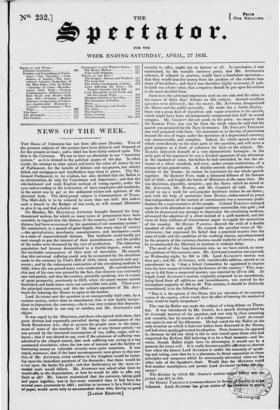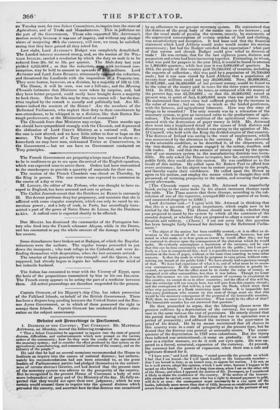NEWS OF THE WEEK.
THE House of Commons has not been idle since Monday. Two of the greatest subjects of the session have been debated, and disposed of for the present at least ; and a third has been fairly entered upon. The first is the Currency. We are to have no alteration in our "monetary system," as it is termed in the political jargon of the day. In other words, the attempt to raise prices and lower the value of money by act of Parliament, for the benefit of debtors and tax-payers, has utterly failed, and mortgagees and fundholders may sleep in peace. The Re- formed Parliament, in its wisdom, has also decided that the Ballot is an abomination, fit only for Frenchmen and Americans ; and that the old-fashioned and truly English method of voting openly, under the -eyes and according to the instruction of their employers and landlords, is the surest way to get at the unbiassed wishes and opinions of the electoral body. The third grand subject is Commutation of Taxes. The Malt-duty is to be reduced by more than one half: this makes such a breach in the Budget of last week, as will compel Ministers to give it up, and find a better one.
On Monday, Mr. Marrnms Arrwoon brought forward his long- threatened motion, for which so many notes of preparation have been sounded, to inquire into the distress of the country, and " how far that distress had been occasioned by the operation of our monetary system." Be maintained, in a speech of great length, that every class of society —the agriculturists, merchants, manufacturers, and mechanics—were in a state of unprecedented distress. The landlords could hardly get tent enough to pay the interest of their incumbrances ; and the profits -of the trader were devoured by the cost of production. The labouring population had become demoralized to a fearful degree ; which was the inevitable consequence of their state of starvation. He argued, that this universal suffering could only be occasioned by the alteration made in the currency by Peel's Bill of 1819, which restored cash pay- ments; and by the subsequent contraction of the circulating medium in 1826, when the one-pound notes were condemned. He considered that . this part of his case was proved by the fact, that distress was extremely rare and partial, and that the country, generally speaking, was in a state
of great prosperity, previously to 1819, when the paper money system flourished, and bank-notes were not convertible into gold. These were the principal statements, and this the solitary argument of Mr. ATT- WOOD for inducing the House to agree to his motion.
Lord ALTHORP met the question in an unexpectedly bold style, by a counter motion, rather than an amendment, that it was highly inexpe- dient to depreciate the currency,—for it was very evident that deprecia- tion, to be effected in one way or another, was Mr. Arrwoon's real object. It was urged by the Ministers, and those who agreed with them, that great distress had repeatedly prevailed during the continuance of the Bank Restriction Act; that at present the people were in the enjoy- ment of more of the comforts of life than at any former period,—as was proved by the increased consumption of tea, coffee, sugar, and to- bacco; that it was absurd to say, even if the existence of suffering was admitted to the alleged extent, that such suffering was owing to a too contracted circulation, when the low rare of interest and the facility of borrowing money on tolerable security were quite notorious. It was
-urged, moreover, that if the least encouragement were given to this mo- tion of Mr. ATTWOOD, every creditor in the kingdom would be insist-
ing upon the immediate payment of bis demands; that there would be
a run upon. the banks for gold ; and that bankruptcy on the most ex- tended scale would follow. Mr. ATTWOOD was asked what limit he
would affix to the depreciation, or how be would be able to affix any limit at all? Mr. GROTE maintained that the currency, taking gold and paper together, was in fact more extended than it had been for
several years previously to 1821 ; and that to increase it bya fresh issue of paper, would serve only to accommodate those who, having no good
security to offer, ought not to borrow at all. In conclusion, it was maintained, by the metallic currency party, that Mr. ATTWOOD'S schemes, if reduced to practice, would have a fraudulent operation—. that they would transfer money from the pockets of the creditor into those of his debtor ; and that it was therefore highly necessary, if pub- lic faith was of any value, that a negative should be put upon his motion in the most decided form
Such were the principal arguments used on one side and the other, in the course of three days' debates on this subject. Several excellent speeches were delivered ; but the mover, Mr. Arrwoom, disappointed the House and the public generally. He made but a feeble display : there was a great deal of repetition and vague assertion in his speech, which might have been advantageously compressed into half its actual compass. Mr. COBBETT did not speak to the point: we suspect that Sir ROBERT PEEL was not far from the truth when he said that his speech was prepared for the Navy Estimates. Mr. POULETT TuomsoN was well prepared with facts : his statement as to the rise of provisions beyond the rise of wages under the operation of a depreciated currency, was unanswerable and complete. Indeed, his whole speech was one which went directly to the main parts of the question, and will serve a good purpose as a book of reference for facts on the subject. Mr. BARING delivered himself of a very characteristic harangue : in the early part of his argument he was a decided opponent of any alteration in the standard of value, but before he had concluded, he was the ad-. vocate of a silver standard, and even, under certain restrictions, of a reissue of one-pound notes. A fatality attends this gentleman's exhi- bitions in the Senate : he cannot be consistent for one whole speech together. Sir ROBERT PEEL made a laboured defence of his famous bill of 1819; and fought the battle of Ministers at the same time. He was dexterous, plausible, sarcastic ; and the blows which he aimed at Mr. ATTWOOD, Mr. BARING, and Mr. CORBETT 811 told. He con- trived to say a word for anti-popular doctrines before he sat down ; and, with the help of quotations from BURKE, endeavoured to prove that independence of the control of constituents was a necessary quali- fication for a representative of the people. Colonel TORRENTS enlarged upon the evils attendant on a paper currency convertible into gold ; and while lie denounced any attempt to depreciate the circulating medium, advocated the adoption of a silver instead of a gold standard, and the issue of forty millions of Government paper to supply the necessities of the country. Sir HENRY PARNELL showed the evils of a double standard of silver and gold. He scouted the peculiar views of Mr . Ammon ; but expressed his belief that a practical inquiry into the state of trade and the condition of the working classes, uncontaminated by the projects of the currency-doctors, would reallybe of service ; and he recommended the Ministry to institute it without delay.
The result of this long discussion was, as we have stated, an utter discomfiture of the currency-men. Mr. ATTWOOD'S motion was rejected, on Wednesday night, by 331 to 139. Lord ALTHORP'S motion was then put ; and Mr. ATTWOOD, with considerable address, moved as an amendment to it, "that a Select Committee be appointed to inquire into the best means of relieving the distress of the country." This, com- ing as it did from a suspected quarter, was rejected by 271 to 134. At length Lord ALTHORP'S motion, originally proposed as an amendment, being freed from all additil.,ns and incumbrances, was carried by the triumphant majority of 304 to 49. This motion, it should be distinctly remembered, is to the following effect- " That it is the opinion of this House, that any alteration of the monetary system of the country, which would have the effect of lowering the standard of value, would be highly inexpedient."
The vote by Ballot was made the subject of a long debate on Thurs- day. It was introduced by Mr. GROTE, in a speech distinguished by its thorough mastery of the question, and not only by close reasoning and research, but by touches of a noble eloquence. Lord ALTHORP was again in one of his dilemmas. He had voted for the Ballot on the only occasion on which it bad ever before been discussed in the House, and had since openlyidvocated its adoption. Now, however, he opposed it—because be did not think it fair to turn round upon those who had supported the Reform Bill believing it to be a final measure—and be- cause, though Ballot might have its advantages, it would not be a panacea for every evil. It is really become apublic affliction to observe how often the honest Lord ALTHORP is under the necessity of speak- ing and voting, now that he is a placeman, in direct opposition to those principles and measures which be strenuously advocated when on the other side of the Speaker's chair. Would that the Ministers could find another mouthpiece, and permit Lord ALTHORP key, ?TA:-
The The division by which Mr. GaoTE's motion o kfiRlot
jetted, was 211 to 105. Sir HENRY PARNELL'S recommendation in favOr, Df-irpary
followed, Lord ALTHOBP bas lives notice of kilarotesti4o to ..poilki4
-
4Ir on Tuesday next, for two Select Committees, to inquire into the state of Agriculture, and of Trade and Manufactures. 'This is judicious on the part of the Government: Those who supported Mr. ATTWOOD'S motion merely because- it was one of inquiry, and without any ulterior views of tampering With the currency, will now, we trust, be satisfied, seeing that they have gained all they asked for.
Last night, Lord ALTHORP'S Budget was completely demolished. The Landed interest mustered strong, and, on the motion of Sir WIL- LIAM INGILBY, carried a resolution by which the duty on malt is to be reduced from 20s. 8d. to 10s. per quarter. The Maltduty last year yielded 4,825,0001.; so that the reduction, ith increased con- sumption, may be held to amount to upwards. illions. Lord ALTHORP and Lord Jonst RUSSELL strenuously the reduction, and threatened the Landlords with the imposition Property-tax.
They were beaten, however, on a division, by a majdrify of 162 to 152..
The House, it will be seen, was not a full one; and the Morning Chronicle intimates that Ministers were taken by surprise, and, had they been better prepared, could easily have brought down a majority to back them. How far this may be true,owe cannot tell : but the doc- trine implied by the remark is morally and politically bad. Are Mi- nisters indeed the masters of the House ? Are the members of the Reformed Parliament, who neglect their duty to their constituents by non-attendance, to be whipped in to a division, like their Rotten Bo- rough predecessors, at the Ministerial word of command ?
The Chronicle fears that Ministers may resign. Three months ago we should have sympathized strongly with the Chronicle, and deprecated the abdication of Lord GREY'S Ministry as a national evil. But the case is now altered, and we have little either to fear or hope on the matter. The bugbear of a Tory Ministry has ceased to alarm us : henceforth we may.have men, nicknamed Tories or. Conservatives, in. the Government —but we can have no Government conducted on Tory principles..























 Previous page
Previous page